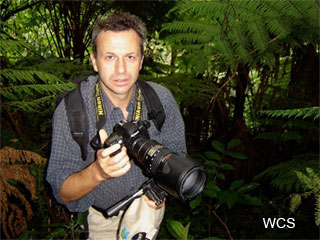Wildlife conservationist in Tanzania awarded prestigious prize
Wildlife conservationist in Tanzania awarded prestigious prize
mongabay.com
May 29, 2008
|
|
A wildlife conservationist working in Tanzania has been awarded the prestigious 2008 Parker/Gentry Award for Conservation Biology.
Awarded by The Field Museum in Chicago, the prize recognizes Dr. Tim Davenport of the Wildlife Conservation Society’s Africa program for his “outstanding achievements in conserving the unique biota of the southern highlands of Tanzania and other endangered habitats of eastern Africa.”
Davenport works with Tanzanian biologists and local community members to protect threatened wildlife and plants in Mt. Rungwe and surrounding montane forests in the East African country. The Wildlife Conservation Society (WCS) says his work has been instrumental in the establishment of Kitulo National Park in Tanzania.
|
|
“The Wildlife Conservation Society is extremely proud of the accomplishments of Dr. Davenport and his team, and we’re grateful to the Field Museum for calling attention to his efforts,” said Dr. Steven E. Sanderson, President and CEO of WCS. “Tim and his team have done remarkable work in helping preserve the Tanzanian Highlands — one of the most unique wild places in all of Africa.”
Established in 1995, the Parker/Gentry award honors “an outstanding individual, team, or organization whose efforts have had a significant impact on preserving the world’s natural heritage, and whose actions and approaches can serve as a model to others.”
Alwyn Gentry, a field botanist and senior curator at the Missouri Botanical Gardens, and Theodore A. Parker, an ornithologist and a senior scientist for Conservation International, were killed in a 1993 plane crash in Ecuador.
An interview with Tim Davenport:
Conserving wildlife in Tanzania, Africa’s most biodiverse country November 8, 2006
With ecosystems ranging from Lake Tanganyika to Mt. Kilimanjaro, Tanzania is the most biodiverse country in Africa. Though Tanzania is world famous for its safari animals, the country is also home to two major biodiversity hotspots: the Eastern Arc Mountains and the Albertine Rift surrounding Lake Tanganyika. Tanzania has set aside nearly a quarter of its land mass in a network of protected areas and more than one-sixth of the country’s income is derived from tourism, much of which comes from nature-oriented travel.
